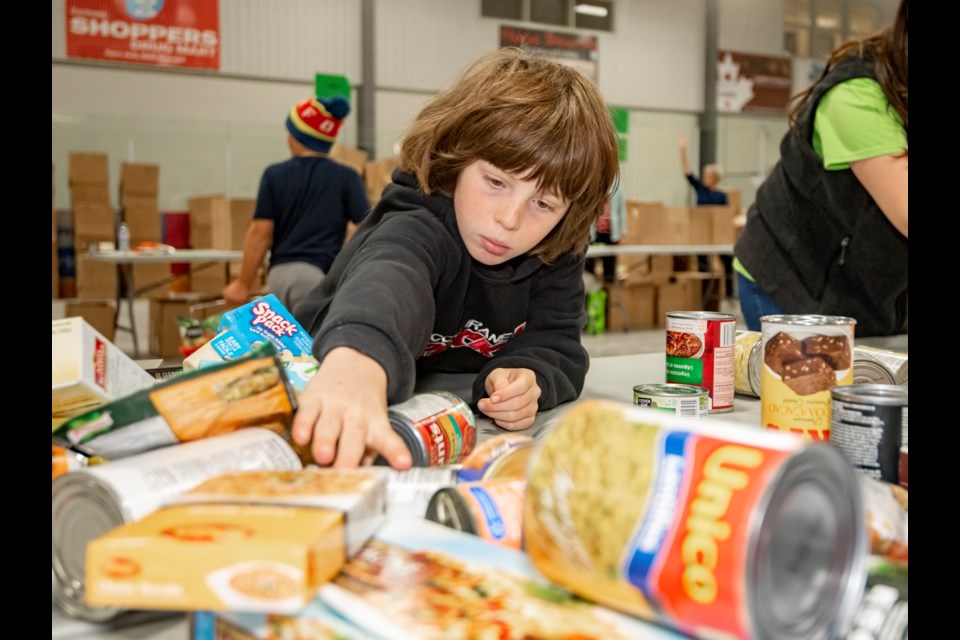A recent study by the University of Toronto reports Alberta as having the highest prevalence of household food insecurity of any province in Canada.
It’s an unsurprising statistic for two Cochrane non-profit groups concerned with food security in the community.
The Helping Hands Society of Cochrane and Area is preparing for its third quarterly food drive in the community on Sept. 17 in north Cochrane neighbourhoods and the surrounding area. According to the non-profit’s food security programs manager April Baird, donations for the food drives have been down this year, but demand is up.
“Last year’s food drive collected 17 pumpkin bins [cardboard bulk bins] full of food from the west side of town,” she said. “This year, in the same area of Cochrane, we filled eight.”
The University of Toronto’s food insecurity report found that almost one in six households in Canada are struggling to put food on their tables. The study found a marked difference in prevalence across the provinces, ranging from 13.1 per cent in Quebec to 20.3 per cent in Alberta.
For Baird, the figures aren't shocking. She noted people are often lined up outside of Cochrane’s free food sheds waiting for Helping Hands personnel to arrive with daily food rescues from local businesses and organizations, which hasn’t been the case until recently.
“The sheds are emptied every day,” said Baird. “We can fill them to the brim and everything will be gone when we get there to stock them the next day. For a while after we opened the first one last year, we weren’t really seeing this problem.”
During the last food drive on May 28, on the west side of Cochrane, Baird also noted that many residents told volunteers they had nothing to give.
“There were people saying they don’t feel comfortable sharing right now, saying their cupboards are bare,” she said. “This is really concerning. There is a lot of anxiety and panic around our economic climate and inflation right now.”
Food insecurity, as the U of T report defines it, means having inadequate or insecure access to food due to financial constraints.
Or, as Baird puts it, it equates to “having to choose between paying a bill or buying groceries.”
The Helping Hands food drives collect donations for the Cochrane Activettes food bank with any leftovers being utilized for Helping Hands’ Meal Teams program and the community’s free food sheds.
Charlene Jeffrey, co-chair for the food bank, added the Activettes have seen a notable increase in applications for food hampers over the past four to six months as well.
“We served about 110 to 120 families this past July, which accounts for just over 300 people,” said Jeffrey. “It’s difficult to compare to last year’s figures with the pandemic, but applications have gone up about 20 per cent from July 2021.”
With demand on the rise, the food bank is also looking at extending its service hours to better meet the needs of the community.
They currently run their hamper operations Tuesdays, Wednesdays and Thursdays for three hours per day. By adding a time slot on Mondays, the hope is the Activettes can accommodate more people in need but not bog down volunteers, as the non-profit relies on its volunteer base to operate effectively, much like Helping Hands.
To run a single quarterly food drive, about 150 volunteers are needed to fill a two to three hours shift collecting donations in the event’s focus area.
The upcoming drive will see volunteers visiting homes in Cochrane Heights, Sunterra Heights, Sunset Ridge, Monterra, Water Valley, and areas of western Rocky View County.
Last year, Helping Hands split up the food drives to hit every corner of the community and surrounding area at the start of 2021 on a quarterly basis. Previously, they held one annual food drive covering the entire community, which required a whopping 850 volunteers to collect donations at doorsteps.
Baird said the non-profit made the decision to change the food drive format to quarterly because they weren’t allowed to organize an event of that size during COVID-19 restrictions.
Plus, volunteerism has been down, she added, which has made organizing the food drives more challenging.
“It’s easy and it’s not a long process … it’s not daunting,” said Baird. “It’s usually only about two or three hours at most on a Saturday morning.
“Anyone that is able to volunteer their time or donate to the food drive, will be making a huge difference in our community, especially right now.”
To sign up as a volunteer for the upcoming food drive, visit helpinghandscochrane.ca.
For those living in the event’s north catchment area who wish to donate on the 17th, Helping Hands asks that non-perishable, unopened donations be left on residents’ doorsteps before 10 a.m., when the food drive begins.
The last collection of 2022 is scheduled to take place Oct. 22 on the south side of Cochrane, including the communities of Fireside, Riverside Heights, Rivercrest, Riversong, The Willows, Precedence and Riviera.




